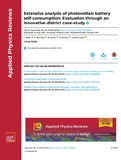Mostrar el registro sencillo del ítem
Extensive analysis of photovoltaic battery self-consumption: evaluation through an innovative district case-study
| dc.creator | Millet, Lluís | es_ES |
| dc.creator | Berrueta Irigoyen, Alberto | es_ES |
| dc.creator | Bruch, Maximilian | es_ES |
| dc.creator | Reiners, N. | es_ES |
| dc.creator | Vetter, M. | es_ES |
| dc.date.accessioned | 2020-01-27T09:50:34Z | |
| dc.date.available | 2021-02-15T00:00:12Z | |
| dc.date.issued | 2019 | |
| dc.identifier.issn | 1931-9401 | |
| dc.identifier.uri | https://hdl.handle.net/2454/36153 | |
| dc.description.abstract | Energy storage is one of the key elements within the actual stage of the energy transition, as it is probably one of the most important factors to allow high penetration of fluctuating renewable energies, such as wind or solar, in the existing power systems. Intensive research is being conducted to assess the economic aspects and technical performance of renewable energy-based systems supported by batteries by evaluating different services that batteries can provide to the electric grid or to the end-consumers. In Germany, where the majority of the currently installed 43 GW of PV capacity corresponds to small residential, commercial, or industrial facilities, an interesting market for batteries to enhance local self-consumption and autarky is already booming, with more than 80 000 storage system installations in 2017. In this context, this study presents a comprehensive analysis of the photovoltaic battery model by analyzing the technical and economic consequences that variations on the most relevant system parameters induce. The presented results are based on high resolution data obtained from a representative residential district with an autarky of above 95%. The employed battery model is based on the results obtained through an extensive test campaign and includes electrical and thermal sub-models. The analysis predicts that grid parity of residential PV battery systems can be reached in the upcoming years, with especially great potential of the retrofitting market for those PV installations which run out of the feed-in tariff policy. | en |
| dc.format.extent | 17 p. | |
| dc.format.mimetype | application/pdf | en |
| dc.language.iso | eng | en |
| dc.publisher | AIP Publishing | en |
| dc.relation.ispartof | Applied Physics Reviews, 6, 021301 (2019) | en |
| dc.rights | © 2019 Author(s). | en |
| dc.subject | Numerical methods | en |
| dc.subject | Energy use and applications | en |
| dc.subject | Energy storage | en |
| dc.subject | Photovoltaics | en |
| dc.subject | Renewable energy | en |
| dc.subject | Energy consumption | en |
| dc.subject | Batteries | en |
| dc.subject | Electrical energy | en |
| dc.subject | Power electronics | en |
| dc.title | Extensive analysis of photovoltaic battery self-consumption: evaluation through an innovative district case-study | en |
| dc.type | info:eu-repo/semantics/article | en |
| dc.type | Artículo / Artikulua | es |
| dc.contributor.department | Institute of Smart Cities - ISC | es_ES |
| dc.rights.accessRights | info:eu-repo/semantics/openAccess | en |
| dc.rights.accessRights | Acceso abierto / Sarbide irekia | es |
| dc.embargo.terms | 2021-02-15 | |
| dc.identifier.doi | 10.1063/1.5049665 | |
| dc.relation.publisherversion | https://doi.org/10.1063/1.5049665 | |
| dc.type.version | info:eu-repo/semantics/publishedVersion | en |
| dc.type.version | Versión publicada / Argitaratu den bertsioa | es |





